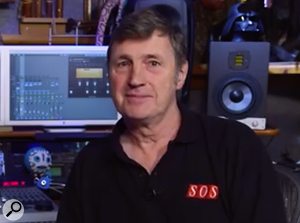 Have you noticed that whenever you buy a new guitar, a new amplifier or a different software guitar amp emulation, the end result still sounds exactly like you? That got me thinking about recording gear, because we have a vast choice of both hardware and software these days. The sheer number of different EQ and compressor plug-ins alone is enough to make your head spin, and when it comes to hardware, there are rackmount compressors, EQs, mic preamps, audio interfaces and reverb processors that can cost anything from under £50$50 to the price of a small car. As for microphones, I can't even begin to count the options — but a recording of a great singer made using an SM58 is always going to sound better than a poor singer using a Neumann U87.
Have you noticed that whenever you buy a new guitar, a new amplifier or a different software guitar amp emulation, the end result still sounds exactly like you? That got me thinking about recording gear, because we have a vast choice of both hardware and software these days. The sheer number of different EQ and compressor plug-ins alone is enough to make your head spin, and when it comes to hardware, there are rackmount compressors, EQs, mic preamps, audio interfaces and reverb processors that can cost anything from under £50$50 to the price of a small car. As for microphones, I can't even begin to count the options — but a recording of a great singer made using an SM58 is always going to sound better than a poor singer using a Neumann U87.
Along the way I've tried a lot of audio products at both ends of the price spectrum, and while there are differences when you compare them directly, the end result when I use them for mixing still always sounds like one of my mixes pretty much regardless of what gear I use. That begs the question, "How much difference does the kit really make?" Clearly, if you are at the professional end of the market, getting the best that's on offer makes sense, but for the rest of us, I have a feeling that the quality of the end result relates more to the way we use our gear and to the quality of the monitoring system that we have to evaluate those results.
I have a feeling that the quality of the end result relates more to the way we use our gear and to the quality of the monitoring system...
That last line is very important, and one conclusion I draw from this is that if you have the money to upgrade anything, it is probably best to spend it on your monitoring system, which should include decent monitors, room treatment and some good headphones to let you hear the mix without the room acoustics getting in the way. Just buying great speakers and putting them in a rubbish room isn't going to get you the results you need. If your room is beyond redemption, then I'd suggest small, inexpensive speakers for tracking or working out parts and then spending a little more on some really good headphones for mixing. If you feel that your mixes sound a little unnatural on headphones, software like Waves' Abbey Road Studio 3 plug-in gets you much closer to the experience of mixing on good monitors in a good room while using headphones — so don't think of mixing on headphones as a compromise. Finally, if you still don't like the way your mixes sound, spending time working through the problems and their solutions will be a better investment than spending money.
Paul White Editor In Chief
